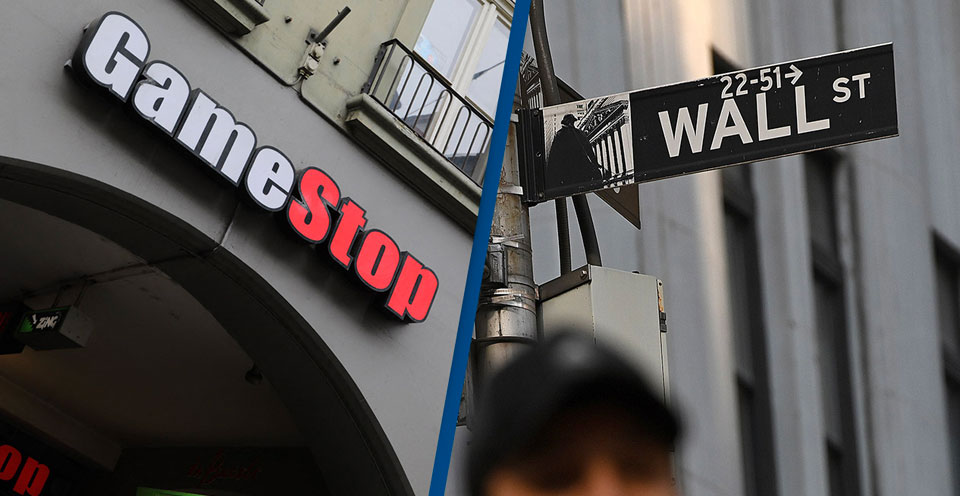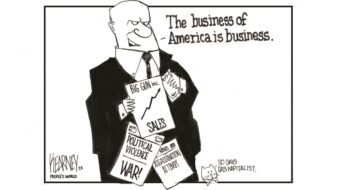
Did we witness the French Revolution of Finance in 2021? Was it Occupy Wall Street 2.0? Depending on who you ask about the GameStop stock phenomenon of last year, those descriptions might actually fit perfectly. The new documentary GameStop: Rise of the Players dives deep into the event that had the world paying close attention (even if we weren’t exactly sure what was happening) when everyday people took on billionaire hedge funds and exposed the market manipulation and corruption of Wall Street. It’s a rollercoaster of a film that shines a much-needed light on a shady space where the wealthiest 1% grow their riches.
Directed by Jonah Tulis and produced by the team that brought the world Console Wars, GameStop: Rise of the Players tells the story of why, in Jan. 2021, the struggling brick-and-mortar video game retailer GameStop was the top news story on every television network and social media platform in the country. The company’s stock had suddenly, seemingly out of nowhere, risen over 2,500%! This despite no new news coming out about the company and the fact that major Wall Street players had been betting on the company’s demise.
Yet, in what turned into an epic “short squeeze” on a handful of billion-dollar hedge fund behemoths, GameStop overcame the odds through the support of thousands of everyday people, costing the hedge fund holders millions of dollars in the process.
In order to understand the significance of what happened with GameStop last year, one would have to understand at least some of the surface happenings of the stock market. Unfortunately, Wall Street, like many of the domains of the uber-rich, lacks transparency. In the case of finance capitalism, it isn’t made easy to understand for working-class people. Which is glaring, given how this eight-block-long street in the Financial District of Lower Manhattan in New York City is considered the symbol and geographic center of American capitalism. The banks, hedge funds, and securities traders who rule from there drive the stock market and basically the whole U.S. financial system.
Fortunately, GameStop: Rise of the Players does a masterful job of giving a quick tutorial of the basics we the audience will need to know in order to fully relish the tale that is about to unfold. The documentary simplifies Wall Street by narrowing in on who we need to focus on: the hedge funds.
Hedge funds are essentially a way for wealthy individuals to pool their money together in the market and get higher returns on investment. Not just anyone can take part in a hedge fund. Individuals have to be of “high net worth,” usually at least one million dollars. Hedge fund managers often use aggressive strategies to produce positive returns for investors. One of those aggressive ways is through short-selling stocks. This is basically when investors are betting on the decline of a company.
Essentially, short-sellers borrow stocks of companies they think are in trouble. Based on their calculations, they believe that such struggling companies are overvalued on the stock market and that their share prices will soon go down. In the meantime, they sell the borrowed shares to other investors who are still willing to pay the current market price. When the deadline approaches for them to return their borrowed stocks, called “closing the position” in Wall Street lingo, the short-seller will then go buy back shares to return.
If the company whose shares they “shorted” does indeed fail, then the hedge funds pocket the difference and potentially make a lot of money. But what happens if, rather than going down, the struggling company’s shares went up instead? And what happens if the company wasn’t actually “struggling” as much as Wall Street said it was? This is where GameStop comes into play.
The brick-and-mortar video game retailer had once been the center of video game culture. GameStop stores were the top spots where players went to buy games, consoles, and trade in old gaming merchandise as well. With the rise of digital downloads, however, many saw GameStop going the way of Blockbuster when Netflix stepped onto the scene.
This was especially true of Wall Street hedge fund managers, who were betting on the retailer going bankrupt. Yet there were a group of working people who happened to be small-time investors who saw the situation differently. For years, they had been going against the mainstream corporate narrative, and in 2021 they helped ignite an event with the central theme of “sticking it” to the wealthy elite.
One may wonder why the defense of a struggling company is being likened to the story of David and Goliath. But you need to understand that the situation with GameStop—where powerful money holders worked their media muscle to create a narrative that made it seem like the retailer was in deep trouble in order to capitalize on its failings—is not an anomaly. Wall Street investors short-sell constantly, hoping to manipulate the outcome, no matter what the consequences are for the businesses and the workers employed by them.
Hedge fund managers can, and often do, make millions of dollars simply by colluding together to hurt the reputation of a company, creating a narrative via their influence in the financial press, that the company will do bad. They make money off the companies they help push off the cliff. Oftentimes, it’s true that such firms really are in trouble. But other times, it can be a case of self-fulfilling prophecy: Short-sellers’ bad predictions fuel the company’s problems by making it harder to access financing and cause other investors to sell off their shares, thus driving down the stock price.
The documentary gives a riveting, meme-filled, Reddit-frenzied aesthetic playout of how all the plotting against GameStop by the hedge funds came tumbling down in 2021. A “short squeeze” occurred when many of these hedge fund investors had to scramble to close out their positions because GameStop’s stock (which they betted against) shot up instead.
How did it shoot up? Because hundreds of thousands of small-time investors, and everyday working people, got wind of the millions of dollars the wealthy were set to lose and jumped in to speed the loss along. They pooled their small accounts—often just a few hundred dollars or less each—to buy up GameStop shares and drive the company’s stock price higher and higher and higher.
This left the short-selling hedge funds no choice but to rush to buy back shares at the increased price in order to return the stocks they had previously borrowed. The rallying cries of the masses across social media included “F*ck Wall Street” and “Squeeze Them.” The film describes how a number of working-class individuals walked away with thousands of dollars—if they timed their exit right—as the Wall Street wealthy lost millions. That is until the powers that be stepped in and halted anyone from being able to invest in GameStop, essentially intervening to save the hedge fund wealthy.
The film dives into this aftermath as well. It makes the point that Wall Street puts on an outer facade that anyone can trade in stocks and “get rich,” but in reality, the chance to really score high amounts of wealth is reserved for those already at the top. We get to see clips of the virtual hearing conducted by the United States House Financial Services Committee entitled “Game Stopped? Who Wins and Loses When Short Sellers, Social Media, and Retail Investors Collide.” There are some delicious moments where the panel chairperson, Rep. Maxine Waters, makes big-time Wall Street players stumble over their words as they try to justify their actions following the GameStop stock rise.
Although the documentary gives us a great heroic story of the little people sticking it to the big man, it also leaves one wondering if anything is really ever going to change when it comes to Wall Street. We’ve been here before with the institution and its drive for profits over consequences. The lack of proper regulation was one of the causes of the 2008 financial crisis. Bad dealings by the banks and wealthy investors are what sparked movements like Occupy Wall Street in the first place. One could argue that the millions that hedge fund investors lost were only a drop in the bucket of their wealth.
If nothing else, this fun documentary shows us that there needs to be more transparency regarding Wall Street, since it controls so much of everyone’s lives. Further, wealthy suit-wearing men in Manhattan shouldn’t be allowed to manipulate value simply on their wants and “predictions.” Wall Street seems like another way capitalists try to obscure where the real value comes from in our society, which is through the labor of all of us. Maybe GameStop: Rise of the Players will inspire more of us to question the system we live under, and who is allowed to manipulate it.
GameStop: Rise of the Players is available in theaters Jan. 28, 2022.












Comments